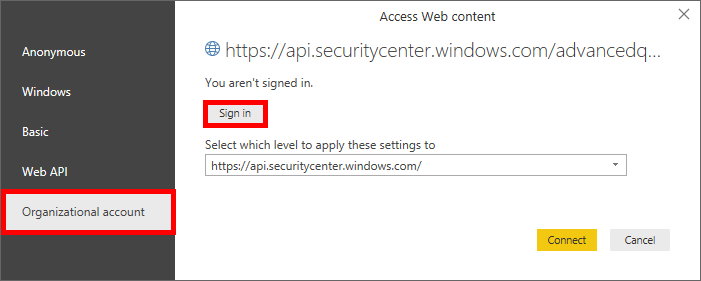หมายเหตุ
การเข้าถึงหน้านี้ต้องได้รับการอนุญาต คุณสามารถลอง ลงชื่อเข้าใช้หรือเปลี่ยนไดเรกทอรีได้
การเข้าถึงหน้านี้ต้องได้รับการอนุญาต คุณสามารถลองเปลี่ยนไดเรกทอรีได้
Applies to:
Want to experience Microsoft Defender for Endpoint? Sign up for a free trial.
Note
If you are a US Government customer, please use the URIs listed in Microsoft Defender for Endpoint for US Government customers.
Tip
For better performance, you can use server closer to your geo location:
- us.api.security.microsoft.com
- eu.api.security.microsoft.com
- uk.api.security.microsoft.com
- au.api.security.microsoft.com
- swa.api.security.microsoft.com
- ina.api.security.microsoft.com
In this section, you learn to create a Power BI report on top of Defender for Endpoint APIs.
The first example demonstrates how to connect Power BI to Advanced Hunting API, and the second example demonstrates a connection to our OData APIs, such as Machine Actions or Alerts.
Connect Power BI to Advanced Hunting API
Open Microsoft Power BI.
Select Get Data > Blank Query.
Select Advanced Editor.
Copy the code snippet below and paste it in the editor:
let AdvancedHuntingQuery = "DeviceEvents | where ActionType contains 'Anti' | limit 20", HuntingUrl = "https://api.securitycenter.microsoft.com/api/advancedqueries", Response = Json.Document(Web.Contents(HuntingUrl, [Query=[key=AdvancedHuntingQuery]])), TypeMap = #table( { "Type", "PowerBiType" }, { { "Double", Double.Type }, { "Int64", Int64.Type }, { "Int32", Int32.Type }, { "Int16", Int16.Type }, { "UInt64", Number.Type }, { "UInt32", Number.Type }, { "UInt16", Number.Type }, { "Byte", Byte.Type }, { "Single", Single.Type }, { "Decimal", Decimal.Type }, { "TimeSpan", Duration.Type }, { "DateTime", DateTimeZone.Type }, { "String", Text.Type }, { "Boolean", Logical.Type }, { "SByte", Logical.Type }, { "Guid", Text.Type } }), Schema = Table.FromRecords(Response[Schema]), TypedSchema = Table.Join(Table.SelectColumns(Schema, {"Name", "Type"}), {"Type"}, TypeMap , {"Type"}), Results = Response[Results], Rows = Table.FromRecords(Results, Schema[Name]), Table = Table.TransformColumnTypes(Rows, Table.ToList(TypedSchema, (c) => {c{0}, c{2}})) in TableSelect Done.
Select Edit Credentials.
Select Organizational account > Sign in.
Enter your credentials and wait to be signed in.
Select Connect.
Now the results of your query appear as a table and you can start to build visualizations on top of it! You can duplicate this table, rename it, and edit the Advanced Hunting query inside to get any data you would like.
Connect Power BI to OData APIs
The only difference from the previous example and this example is the query inside the editor.
Open Microsoft Power BI.
Select Get Data > Blank Query.
Select Advanced Editor.
Copy the following code, and paste it in the editor to pull all Machine Actions from your organization:
let Query = "MachineActions", Source = OData.Feed("https://api.securitycenter.microsoft.com/api/" & Query, null, [Implementation="2.0", MoreColumns=true]) in SourceYou can do the same for Alerts and Machines. You also can use OData queries for queries filters. See Using OData Queries.
Power BI dashboard samples in GitHub
See the Power BI report templates.
Sample reports
View the Microsoft Defender for Endpoint Power BI report samples.
Related articles
Tip
Do you want to learn more? Engage with the Microsoft Security community in our Tech Community: Microsoft Defender for Endpoint Tech Community.




